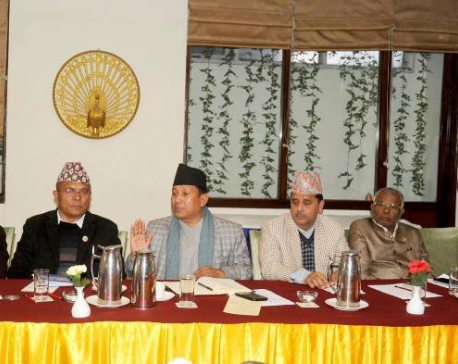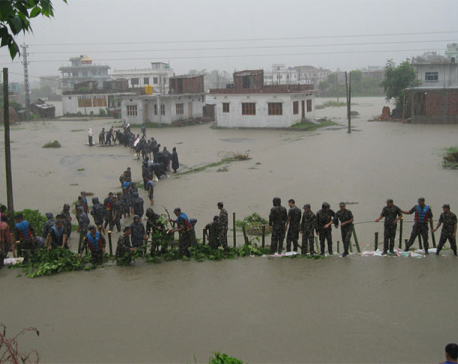
OR
3 years on, language commission in limbo for lack of full shape
Published On: October 31, 2019 07:02 AM NPT By: Republica | @RepublicaNepal
KATHMANDU, Oct 31: Three years into its five-year term, the Language Commission, a constitutional body tasked with recommending languages to the federal and provincial governments as the medium for carrying out their official business, has yet to get full shape.
The government-appointed former education secretary Lava Deo Awasthi as chief of the commission in September 2016, just one week before the constitutional deadline for the commission’s formation. Article 287 of the constitution has specified that such a commission should be formed within a year of the commencement of the new constitution, which was promulgated in September 2015.
The commission does not yet have representatives from the provinces and in the absence of such representation, it has been struggling to finalize the criteria for identifying the major languages spoken in each province.
“The commission has failed to carry out intensive debate over the possible languages for official business in the provinces, given the absence of representatives from the provinces,” said Chairperson Awasthi. “The commission has not been able to function and take decisions because it has not been given full shape.”
The constitution states that the commission should have representatives from all the provinces but no province has sent in any representative. In the three years since its formation, only Usha Hamal, a government-appointed former bureaucrat, has become a member of the commission.
The commission is tasked with recommending the languages for official business after deciding on the criteria for a language to qualify for this purpose. According to the census of 2011, there are 123 languages spoken in Nepal.
But the commission has been planning to conduct a language survey as many stakeholders suggested that the eight-year-old census cannot represent the present status of languages spoken in the various provinces.
“We have proposed to the government to conduct a quick language survey as questions have been raised about the continuing relevance of the 2011 census,” said Awasthi.
The constitution has specified altogether five major tasks for the commission. These include determining the criteria for recognition as official languages and recommending the languages to the government, making recommendations to the government on the measures to be adopted for the protection, promotion and development of various languages, measuring the levels of development of different mother tongues and making suggestions to the government on the potential for their use in education, and monitoring, studying and carrying out research on languages.
With the commission in a state of limbo, the local-level governments have been choosing languages for official business on their own through the decisions of the municipal assemblies and without any specific criteria.
However, under existing law, the recommendations of the commission are not binding on the local governments. Kirtipur Municipality has decided to adopt Nepalbhasa or Newari as its official language in addition to Nepali while various other local governments have decided to pick other local languages.
The reluctance of the government and the political leadership has been blamed for the delay in appointing the members at the Language Commission. “We have requested the government to appoint members, ensuring proper representation from the provinces. But we received nothing more than assurances,” said Awasthi.
The terms of the chief and other office bearers of the commission will be six years and these terms cannot be extended, according to the Language Commission Act 2016.
You May Like This

Govt to establish social development offices in all districts
KATHMANDU, Jan 16: The government is planning to establish social development offices in all districts. ... Read More...

Local bodies’ associations call for revision in laws
KATHMANDU, Oct 20: The National Association for Rural Municipalities in Nepal (NARMN), an umbrella organization of local bodies in the... Read More...

Provincial govts ill-prepared to tackle disasters
KATHMANDU, July 21: Constraint of resources and lack of planning continue to hit the rescue, relief and rehabilitation works as... Read More...




Just In
- MoHP cautions docs working in govt hospitals not to work in private ones
- Over 400,000 tourists visited Mustang by road last year
- 19 hydropower projects to be showcased at investment summit
- Global oil and gold prices surge as Israel retaliates against Iran
- Sajha Yatayat cancels CEO appointment process for lack of candidates
- Govt padlocks Nepal Scouts’ property illegally occupied by NC lawmaker Deepak Khadka
- FWEAN meets with President Paudel to solicit support for women entrepreneurship
- Koshi provincial assembly passes resolution motion calling for special session by majority votes







_20220508065243.jpg)





Leave A Comment